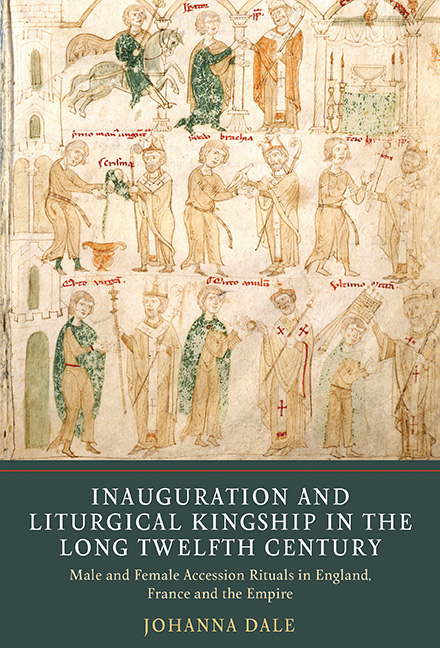 Inauguration and Liturgical Kingship in the Long Twelfth Century
Inauguration and Liturgical Kingship in the Long Twelfth Century Book contents
- Frontmatter
- Contents
- List of Illustrations
- Acknowledgements
- List of Abbreviations
- Timeline
- Genealogies
- Introduction
- 1 Liturgical Texts: The Spoken Word and Song
- 2 Liturgical Rituals: Rubrication and Regalia
- 3 Who and Where? Actors, Location and Legitimacy
- 4 What and When? Consecration and the Liturgical Calendar
- 5 Royal Titles, Anniversaries and their Meaning: The Charter Evidence
- 6 Seal Impressions and Christomimetic Kingship
- Conclusion
- Appendix 1 Editions and Manuscripts of the Selected Ordines
- Appendix 2 Prayer Formulae Incipits
- Appendix 3 Tables of Ritual Elements in the Ordines
- Appendix 4 Brief Descriptions of Royal and Imperial Seals and Bullae
- Bibliography
- Index of Biblical References
- General Index
- Frontmatter
- Contents
- List of Illustrations
- Acknowledgements
- List of Abbreviations
- Timeline
- Genealogies
- Introduction
- 1 Liturgical Texts: The Spoken Word and Song
- 2 Liturgical Rituals: Rubrication and Regalia
- 3 Who and Where? Actors, Location and Legitimacy
- 4 What and When? Consecration and the Liturgical Calendar
- 5 Royal Titles, Anniversaries and their Meaning: The Charter Evidence
- 6 Seal Impressions and Christomimetic Kingship
- Conclusion
- Appendix 1 Editions and Manuscripts of the Selected Ordines
- Appendix 2 Prayer Formulae Incipits
- Appendix 3 Tables of Ritual Elements in the Ordines
- Appendix 4 Brief Descriptions of Royal and Imperial Seals and Bullae
- Bibliography
- Index of Biblical References
- General Index
Summary
In a 1982 essay on twelfth-century kings and kingship, Karl Leyser commented that ‘the most common characteristic of twelfth-century rulers … seems to have been chicanery’. Thirty-five years later few scholars would disagree with his assessment that deceit and subterfuge were indeed hallmarks of high medieval kingship. Leyser provides as an example of such deviousness the advice that the Empress Matilda apparently gave to her son Henry II. To paraphrase Walter Map, who disapproved of Henry's man-management techniques, Matilda advised Henry to treat his followers mean to keep them keen. Prone to fits of unspeakable rage, Henry II hardly cuts a figure sympathetic to modern sensibilities. However, like many duplicitous men, Henry could be charming too. This charm was often in evidence in Henry's interactions with his monarchical counterparts. At his obsequious best, the Plantagenet could be a model of humility, stressing his subservience to his Capetian and Hohenstaufen contemporaries in such honeyed terms that it is not just modern historians who doubt his sincerity.
The fawning letter that Henry II sent to Frederick Barbarossa in 1157 has been the subject of much scholarship. Until the 1960s, scholars accepted Henry's flattery at face value and the letter was held up as the ultimate example of the power and influence a medieval German emperor could exercise over kings in neighbouring lands. It is easy to understand why it became, as Leyser described it, ‘the crown-witness for the view that the imperium had, if not a direct lordship, at least some kind of indefinable ascendancy over all the regna’. Henry, in most deferential terms, claimed that he would do whatever Frederick desired. Except, of course, as Leyser pointed out, Henry refused to do the one thing that Frederick did actually want: for the king to hand over the Hand of Saint James. Brought from Germany to England by Henry's mother the Empress Matilda, the relic was to stay at his grandfather's foundation at Reading. That a relic of the Apostle James was the subject of twelfth-century monarchical diplomacy serves to remind us of the extent to which liturgical and political concerns intermingled. Relics provided a material focus for liturgical ceremonial and, as we have seen in chapters 3 and 4, commemoration of the Apostle James was intertwined with royal ritual within the Empire on more than one occasion.
- Type
- Chapter
- Information
- Inauguration and Liturgical Kingship in the Long Twelfth CenturyMale and Female Accession Rituals in England, France and the Empire, pp. 215 - 224Publisher: Boydell & BrewerPrint publication year: 2019


